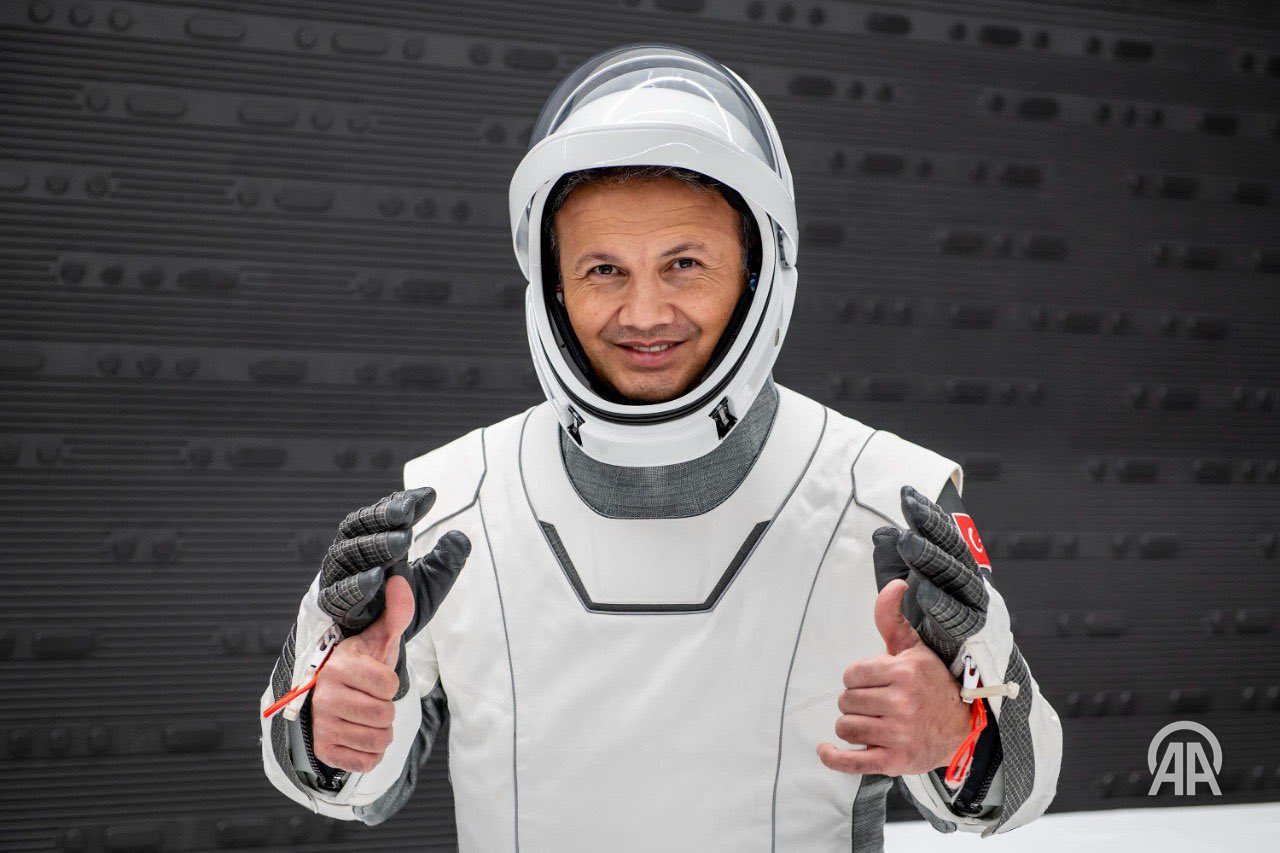Türkiye's 1st space traveler set to tackle 13 scientific experiments on board International Space Station

F-16 fighter pilot Col. Gezeravci set to blast off from Florida on his way to 2-week stay in orbit around the Earth
ISTANBUL
Just hours from now, Türkiye's very first space traveler, Alper Gezeravci, is headed to the International Space Station to do more than a dozen scientific experiments over the course of his two-week stay while in Earth orbit.
After a Jan. 9 launch date was delayed, the F-16 pilot is scheduled to blast off from the US state of Florida at 1.11 am local time on Thursday (GMT2211 Wednesday) on the Ax3 mission.
Col. Gezeravci is taking in the mission along with a group of Spanish, Italian, and Swedish colleagues.
The international crew is expected to dock with the International Space Station at 1.15 p.m. (GMT1015) on Friday.
During the two-week mission on the space station, Gezeravci will be very busy, as he tackles 13 different scientific experiments on behalf of universities and scientific centers in Türkiye.
Experiments
Gezeravci’s first experiment was developed by the Marmara Research Center of the Scientific and Technological Research Council of Türkiye (Tubitak), based in northwestern Türkiye, to study the production of high-strength alloys resistant to high temperatures.
The second experiment developed by the Marmara center, the gMETAL experiment, will investigate the effects of gravity on the creation of a homogeneous mixture between solid particles and a fluid medium under conditions without a chemical reaction.
An experiment developed by Türkiye's Bogazici University with the Marmara center seeks to carry out growth and endurance tests of microalgae species adapted to harsh earthly conditions under non-gravity conditions, to examine their metabolic changes, determine their carbon dioxide capture performance and oxygen production capabilities, and develop a life support system.
The Extremophyte project, developed by Ege University in the Aegean city of Izmir, Türkiye, seeks to reveal the transcriptome by next generation sequencing in plants grown in space and on earth which are exposed to salt stress, and to compare some physiological and molecular responses of glycophytic and halophytic plants to salt stress in microgravity.
The Metabolom experiment from Ankara University in the Turkish capital aims to explore the negative effects of space conditions on human health. To curb these effects, it will examine the physiological and biochemical changes in gene expression and metabolism of astronauts taking part in space missions.
The Myeloid experiment developed by Ankara’s Hacettepe University aims to measure and evaluate the travel and space conditions and cosmic radiation damage that space mission participants are exposed to immunologically at the level of myeloid-derived suppressor cells.
The Message experiment, developed by Istanbul’s Uskudar University using CRISPR gene engineering methods, seeks to identify genes whose function has not yet been discovered and to determine which immune cells will be directly affected by gravity during space missions.
With the Algalspace experiment, developed by Istanbul’s Yildiz Technical University, the growth data of Antarctic and temperate microalgae in space will be compared, and a study on the use of polar algae in space will be carried out for the first time. In space, algae will be investigated for use in oxygen regeneration from carbon dioxide, additional food supply, water improvement, and life support.
The CRISPR-Gem experiment, also from Yildiz University, seeks to investigate the effectiveness of CRISPR gene editing techniques of molecular biology, on plants in a microgravity environment in order to understand and improve the defense mechanisms of plants, which are the skeleton of bioregenerative life support systems meant to provide a sustainable system in long-term space missions, one of the chief hurdles for the future of humanity in space.
With the Pranet experiment prepared by Mus Science and Art Center students, the effect of propolis on bacteria in microgravity environments will be investigated.
The VocalCORD experiment conducted by Istanbul’s Halic University will try to detect disturbances in the physiology of the respiratory system from frequency changes in the voice with the support of smart watch artificial intelligence and to investigate the effects of zero gravity on the human voice.
The Oxygen Saturation experiment from Istanbul’s Nisantasi University seeks to identify the differences and disorders caused by low gravity by calculating the oxygen level of the air given with the support of artificial intelligence.
With the Miyoka experiment from the Tubitak Space Technologies Research Institute, Gezeravci will assemble lead-free components on an electronic card in the station, and later back on Earth subject them to detailed examination, testing the effects of microgravity on the lead-free soldering process.
Space voyage years in the making
After President Recep Tayyip Erdogan announced the National Space Program in 2021, efforts were launched to send a Turkish citizen into space.
The astronaut applications were published by the Turkish Space Agency in May 2022, with the selection of candidates based on their work and expertise in engineering, physics, medicine, astronomy, and sports.
Last April, Erdogan announced that Gezeravci would be the first-ever Turkish space traveler, unveiling his name at TEKNOFEST, Türkiye’s premier technology event.
The Turkish Space Agency was established in 2018 and announced its space program in 2019, as well as its intention to send a crewed mission into space.
This Tuesday, Erdogan also stressed the significance of the Ax3 mission, both as a scientific endeavor and as a source of inspiration for children and young people.
Erdogan voiced hope that the mission “would be a new beginning,” adding: “We will continue this mission. We will always aim higher.”





